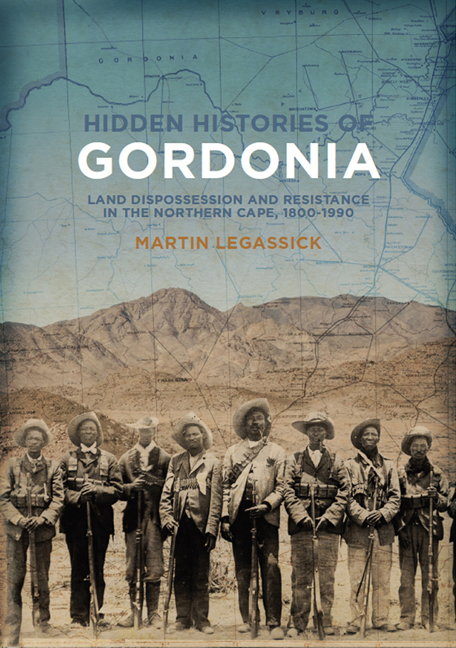Book contents
- Frontmatter
- Dedication
- Contents
- Acknowledgements
- Acronyms and abbreviations
- Illustrations
- Preface
- Chapter 1 The prehistory of Gordonia
- Chapter 2 The Baster settlement of Gordonia and its decline
- Chapter 3 The will of Abraham and Elizabeth September: a struggle for land in Gordonia, 1898–2014
- Chapter 4 From prisoners to exhibits: representations of Bushmen of the northern Cape, 1880–1900
- Chapter 5 South African human remains and the politics of repatriation: reconsidering the legacy of Rudolf Pöch
- Chapter 6 The early history of the brown Afrikaners in Riemvasmaak
- Chapter 7 The battle of Naroegas
- Chapter 8 The Marengo rebellion and Riemvasmaak, 1903–1907
- Chapter 9 The racial division of Gordonia, 1921–1930
- Chapter 10 Keidebees and Blikkies locations, Upington, 1894–1974
- Chapter 11 ‘All my powers have been swallowed by Upington’: the life and times of Alfred Gubula
- References
- Index
Chapter 2 - The Baster settlement of Gordonia and its decline
Published online by Cambridge University Press: 20 April 2018
- Frontmatter
- Dedication
- Contents
- Acknowledgements
- Acronyms and abbreviations
- Illustrations
- Preface
- Chapter 1 The prehistory of Gordonia
- Chapter 2 The Baster settlement of Gordonia and its decline
- Chapter 3 The will of Abraham and Elizabeth September: a struggle for land in Gordonia, 1898–2014
- Chapter 4 From prisoners to exhibits: representations of Bushmen of the northern Cape, 1880–1900
- Chapter 5 South African human remains and the politics of repatriation: reconsidering the legacy of Rudolf Pöch
- Chapter 6 The early history of the brown Afrikaners in Riemvasmaak
- Chapter 7 The battle of Naroegas
- Chapter 8 The Marengo rebellion and Riemvasmaak, 1903–1907
- Chapter 9 The racial division of Gordonia, 1921–1930
- Chapter 10 Keidebees and Blikkies locations, Upington, 1894–1974
- Chapter 11 ‘All my powers have been swallowed by Upington’: the life and times of Alfred Gubula
- References
- Index
Summary
In 1880 a Baster settlement was established north of the Orange River in Koranaland – which became Gordonia. The attempt to stabilise the northern Cape border between the Aughrabies Falls and Griqualand West by means of treaties with (missionised) Korana chiefs had failed with the renewed colonialrebel war in 1878–9. So far as the colonial government was concerned, here was a vacuum which needed to be filled.
The establishment of the Baster settlement
In early July, Thomas Upington made the first government proposals for a post-war settlement. He was against annexing territory north of the Orange, regarding the river as the most convenient northern border. However he was for declaration of a 16-kilometre strip north of the river between Griqualand West and the Bondelswarts boundary as ‘neutral ground’ policed by a border force barracked at Olyvenhout's Drift, and recommended moving the seat of magistracy there from Kenhardt. He was also for granting ‘the Koranna and Africander country to the respective chiefs’ on condition that they took an oath of allegiance to the Queen, and accepted the right of the Colony to annex at any time.
Before that, in May, the Reverend Schroeder had proposed annexation of Koranaland and the establishment of a Baster settlement, under ‘[a] Government officer, under whatever name, with a few constables. The Bastards or inhabitants of Koranaland for the future subject to military service. The land on the Orange River in Korannaland to be distributed as a Bastard “location”… The Government must feel it necessary that the Bastards, as a coloured race, should be supported in their weakness against the whites, so that they not be driven away altogether.’ He also pleaded that unless the Basters were allowed to settle mission work in the area ‘would be impossible’, and he (perhaps contradictorily) opposed the establishment of a police station: ‘A mission station cannot be a police station.’
The problem now passed into the hands of the newly appointed special magistrate J.H. Scott, who arrived in the area with Upington in March 1879 and took over when Upington left. Scott was then almost 36 years old. He had begun his career in ‘native affairs’ as provisional magistrate with Bacala in Tembuland from August 1876 to October 1878.
- Type
- Chapter
- Information
- Hidden Histories of GordoniaLand dispossession and resistance in the Northern Cape, 1800–1990, pp. 31 - 84Publisher: Wits University PressPrint publication year: 2016



